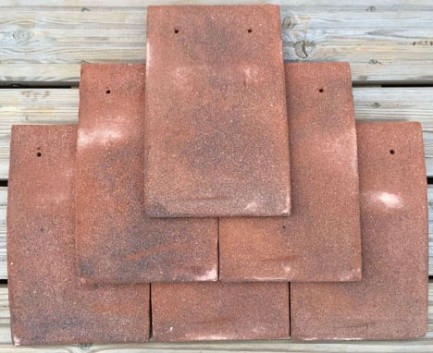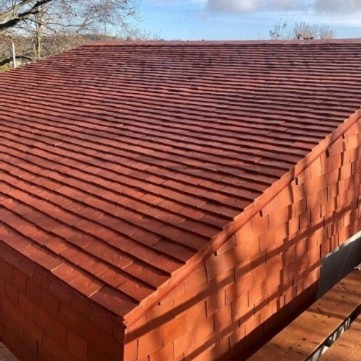Georgian Roof Tiles in Hampshire
Heritage Tiles: Emblematic of the finest craftsmanship
Heritage tiles are the professional roofer's choice for the highest quality clay roof tiles. We pride ourselves in manufacturing, stocking, and delivering the very finest in prestige clay roof tiles.
Heritage Tiles have several tile ranges that satisfy every architectural requirement. Vintage and historic properties right up to modern new builds are covered by the diverse range of clay roof tiles that we stock.
So, whether you are in the building trade, or simply wish to choose your own tiles, Heritage Tiles have the right product for your specific requirements.
What Heritage Tiles have to offer our customers?
- We offer specification and technical solutions to help you achieve the perfect build.
- We also offer expert design advice to all our customers.
- We are happy to engage in site visits with our clients.
- We have stockists and distributors throughout the United Kingdom to ensure that we can provide our expert service to a wider area.
- We can provide estimated quantities from plans supplied by our clients.
- We offer battening plans.
- We can deliver a standard and bespoke colour choice for our clay tile products.
- All our tiles are assessed and approved by Lucideon.
- We provide a nationwide delivery and collection service.
The ranges of clay roof tiles we supply.
The Clayhall Range of roof tiles:

Clayhall Medium Blend - Carefully crafted to replicate all the features of handmade the Clayhall hand crafted range of tiles offers an excellent alternative when budget restrictions are a concern, but without compromising quality or durability.
Clayhall Dark Blend - Quality and durability in a budget clay roof tile. The Clayhall dark blend is sure to turn heads.
Clayhall Red Blend - A beautiful rustic clay roof tile. The Clayhall red blend is a firm favourite with our customers.
Clayhall Hamlet Mix - The Clayhall Hamlet mix is a gorgeous light and sandy looking clay roof tile that is a perennial favourite in the building trade.
Clayhall Birchwood Mix - The Clayhall Birchwood mix offers a gorgeous blend of lighter and darker shades in this diverse clay roof tile. If you are concerned that your roof tiles could look monotonous, the Clayhall Birchwood mix is the clay roof tile to choose.
The Conservation Range of roof tiles

The Conservation range of roof tiles are available in a range of distinctive colours, created by using a very fine sand, The Conservation Weathered; A natural warm tone, achieving an instant mellow and settled look and The Conservation Red; perfect for vertical tiling especially suited for villages and hamlets with olde world vernacular charm.
Manufactured using high quality clay, achieving high strength and durability properties, giving homeowners and contractors peace of mind for many years to come. The conservation range comes with a complete set of associated fittings, including Hog Back Ridge, Half Round Ridge, Bonnet Hips, Valley tiles and External Angles.
The Conservation range of clay roof tiles comes in the following variations:
- Conservation Red
- Conservation Weathered
- Conservation Dark
Conservation Peg Tile
Plain clay roofing tiles laid to a double lap have been used for roof covering in England since before the Norman Conquest and tiles dating back to Roman Times have been discovered under excavation. From the outset clay plain tiles were made incorporating fixing features.
The Classic Edwardian roof tile
The Classic range of plain tiles is one of the finest ranges of clay tiles.
We source only the best raw materials for our craftsman to create beautifully handmade clay tiles of the highest quality and durability.
Tile Fittings available from Heritage Tiles
There are many fittings that are available from us a Heritage Tiles to complete your build to perfection. We stock and supply the following:
- Gable Tile
- Eave Tile
- Baby Porch Ridge
- 90 Degree Ext. Angle
- Universal Bonnet Hip
- Half Round Ridge
- Hogs Back Ridge
- Mono Ridge
- Third Round Ridge
- Universal Valley
- Ornamental Club
- Bat Tile Set
Bat Tiles:
Provide help for our bats with our range of bat friendly roof tiles.
Did you know that all UK bats and their roosts are protected by law? The Wildlife and Countryside Act introduced in 1981, gave legal protection to all bat species and their roosts in England.
Distinct species of bats prefer differing places to roost. The two most usually found species of bat in the UK are the Pipistrelle and Brown Long-Eared Bat. Pipistrelle prefer confined spaces such as under tiles on roofs and hanging spaces. The Brown Long-Eared Bat prefer roof timbers and ridges inside lofts. Heritage Clay Tiles can provide purpose made access points within your roof tiles or ridge tiles. The Bat Tile Set can form part of a mitigation package required by law for existing roosts or as potential access where a roost had not previously been present.
Select a Blend
Getting the right blend for your roofing project can feel daunting, but with our blend generator you can mix and match various blends of tiles to achieve the perfect blend.
Click here to make use of our online tool to choose your own unique blend.
Because our strict quality control provides a consistent tile size you can mix assorted styles and colours of tiles to make your roof unique to you. Please use the tool below to experiment with various blends.
Adjust the sliders to set the ingredients for your desired blend then click on the update mix button.
Alternatively click on any blend or tile to display it.
Whatever type of clay roof tile you want, Heritage Tiles will be able to help.
Georgian Roof Tiles
The life span of a Georgian roof tile
Georgian properties that used Georgian clay roof tiles were built between 1714 and 1830.
When you consider that the average life span of a clay roof tile is sixty years, it stands to reason that many of these types of properties will require new roof tiles fitted to replace the older worn and damaged ones.
The production process of many clay roof tiles is similar across manufacturers, and despite differences in the sand or coatings used, most tiles would have a comparable sixty year lifespan.
Georgian houses in the United Kingdom can be some of the most attractive architecture you will see today. The term Georgian, comes after the rule of the Georges in succession, from George I to George IV.
Gerorgian properties were typically built with local stone, as at the time transportation of heavy materials was difficult as there were no railways. The Georgian styled properties were designed with a great sense of symmetry. In detached Georgian houses, the front doors are placed in the centre with rooms either side, framed by multi paned sash windows. Many of these windows were surrounded with vertically hung Georgian clay tiles.
New Georgian roof tiles for a renovation
It should also be noted that as the original Georgian roof tiles were replaced with modern materials such as concrete, the buildings could often suffer extra stress owing to the extra weight of the newer materials.
Now you can take advantage of modern tiles, that are constructed by hand in the time honoured tradition to suit any property, regardless of the period they were built in. Our Georgian roof tiles are a prime example of the quality that can be achieved when traditional manufacturing methods are adhered to.
A little information about Hampshire
Hampshire home of New Forest ponies
The New Forest pony is one of the most recognised mountain and moorland or native pony breeds of the British Isles. This particular pony generally has a height from around 12 to 14.2 hands; these Hampshire ponies are renowned for being strong and are good for riding. They are valued for hardiness, strength, and sure footedness owing to their habitat.
The breed is indigenous to the New Forest in Hampshire in southern England, where horses have lived since before the last Ice Age; remains dating back to 500,000 BC have been found within 50 miles of the heart of the modern New Forest. DNA studies have shown ancient shared ancestry with the Celtic type Asturcon and Pottok ponies. Many breeds have contributed to the foundation bloodstock of the New Forest pony, but today only ponies whose parents are both registered as purebred in the approved section of the stud book may be registered as purebred. The New Forest pony can be ridden by children and adults, can be driven in harness, and competes successfully against larger horses in horse show competition.
All ponies grazing on the New Forest are owned by New Forest commoners. These are people who have rights of common of pasture over the Forest lands. An annual marking fee is paid for each animal turned out to graze. The population of ponies on the Forest has fluctuated in response to varying demand for young stock. Numbers fell to fewer than six hundred in 1945, but have since risen steadily, and thousands now run loose in semi wild conditions. The welfare of ponies grazing on the Forest is monitored by five Agisters. An agister is a local official whose role is to assist the Verderers with their duty to manage the free roaming animals of the New Forest in Hampshire. Each Agister takes responsibility for a different area of the Forest. The ponies are gathered annually in a series of drifts, to be checked for health, wormed, and they are tail marked; each pony has their tail trimmed to the pattern of the Agister responsible for that pony. Purebred New Forest stallions approved by the Breed Society and by the New Forest Verderers run out on the Forest with the mares for a short period each year. Many of the foals bred on the Forest are sold through the Beaulieu Road pony sales, which are held several times each year.
Ponies have grazed in the area of the Hampshire New Forest for many thousands of years, predating the last Ice Age. Spear damage on a horse shoulder bone discovered at Eartham Pit, Boxgrove, about 50 miles from the middle of the New Forest, dated 500,000 BC, demonstrates that early humans were hunting horses in the area at that time, and the remains of a large Ice Age hunting camp have been found close to Ringwood. Evidence from the skeletal remains of ponies from the Bronze Age suggests that they resembled the modern Exmoor pony. Horse bones excavated from Iron Age ritual burial sites at Danebury, indicate that the animals were approximately 12 hands, a height similar to that of some of the smaller New Forest ponies of today.
The King and the Hampshire forest
William the Conqueror, claimed the New Forest as a royal hunting ground and shipped more than two thousand horses across the English Channel when he invaded England in 1066. The earliest written record of horses in the New Forest dates back to that time, when rights of common of pasture were granted to the local inhabitants. A popular tradition linking the ancestry of the New Forest pony to Spanish horses said to have swum ashore from wrecked ships at the time of the Spanish Armada has long been accepted as a myth, however, the offspring of Forest mares, probably bred at the Royal Stud in Lyndhurst, were exported in 1507 for use in the Renaissance wars. A genetic study in 1998 suggested that the New Forest pony has ancient shared ancestry with two endangered Spanish Celtic type pony breeds, the Asturcon and Pottok.
The most notable stallion in the early history of the breed was a Thoroughbred named Marske, the sire of Eclipse, and a great grandson of the Darley Arabian. Marske was sold to a Ringwood farmer for twenty guineas on the death of Prince William, Duke of Cumberland, and was used to breed with country mares in the 1760s.
In the 1850s and 1860s, the quality of the ponies was noted to be declining, a result of poor choice of breeding stallions, and the introduction of Arab to improve the breed was recommended. The census of stock of 1875 reported just under three thousand ponies grazing the Hampshire Forest, and by 1884 the number had dropped to 2,250. Profits from the sale of young ponies affected the number of mares that commoners bred in subsequent years. The drop in numbers on the Forest may have been a consequence of introducing Arab blood to the breed in the 1870s, resulting in fewer animals suitable for use as pit ponies, or to the increase in the profits from running dairy cattle instead of ponies. The Arab blood may have reduced the ponies natural hardiness to thrive on the open Forest over winter. Numbers of ponies on the Forest also declined as a result of demand for more refined looking ponies for riding and driving work prior to the introduction of motor vehicles. Later, the Second World War drove up the demand for, and thus, the market value of, young animals for horse meat.
Products available from Heritage Clay Tiles Ltd in East Sussex
Clay Roof Tiles in East Sussex
Clayhall Roof Tiles in East Sussex
Conservation Roof Tiles in East Sussex
Edwardian Roof Tiles in East Sussex
Victorian Roof Tiles in East Sussex
Georgian Roof Tiles in East Sussex
Handmade Clay Tiles in East Sussex
Handmade Roof Tiles in East Sussex
High Quality Roof Tiles in East Sussex
Traditional clay tiles in East Sussex
Traditional roof tiles in East Sussex
Products available from Heritage Clay Tiles Ltd in Essex
Conservation Roof Tiles in Essex
High Quality Roof Tiles in Essex
Traditional clay tiles in Essex
Traditional roof tiles in Essex
Products available from Heritage Clay Tiles Ltd in Hampshire
Clayhall Roof Tiles in Hampshire
Conservation Roof Tiles in Hampshire
Edwardian Roof Tiles in Hampshire
Victorian Roof Tiles in Hampshire
Handmade Clay Tiles in Hampshire
Handmade Roof Tiles in Hampshire
High Quality Roof Tiles in Hampshire
Traditional clay tiles in Hampshire
Traditional roof tiles in Hampshire
Products available from Heritage Clay Tiles Ltd in Hertfordshire
Clay Roof Tiles in Hertfordshire
Clayhall Roof Tiles in Hertfordshire
Conservation Roof Tiles in Hertfordshire
Edwardian Roof Tiles in Hertfordshire
Victorian Roof Tiles in Hertfordshire
Georgian Roof Tiles in Hertfordshire
Handmade Clay Tiles in Hertfordshire
Handmade Roof Tiles in Hertfordshire
High Quality Roof Tiles in Hertfordshire
Traditional clay tiles in Hertfordshire
Traditional roof tiles in Hertfordshire
Products available from Heritage Clay Tiles Ltd in Kent
Conservation Roof Tiles in Kent
High Quality Roof Tiles in Kent
Traditional clay tiles in Kent
Traditional roof tiles in Kent
Products available from Heritage Clay Tiles Ltd in London
Conservation Roof Tiles in London
Edwardian Roof Tiles in London
Victorian Roof Tiles in London
High Quality Roof Tiles in London
Traditional clay tiles in London
Traditional roof tiles in London
Products available from Heritage Clay Tiles Ltd in Surrey
Conservation Roof Tiles in Surrey
Edwardian Roof Tiles in Surrey
Victorian Roof Tiles in Surrey
High Quality Roof Tiles in Surrey
Traditional clay tiles in Surrey
Traditional roof tiles in Surrey
Products available from Heritage Clay Tiles Ltd in West Sussex
Clay Roof Tiles in West Sussex
Clayhall Roof Tiles in West Sussex
Conservation Roof Tiles in West Sussex
Edwardian Roof Tiles in West Sussex
Victorian Roof Tiles in West Sussex
Georgian Roof Tiles in West Sussex
Handmade Clay Tiles in West Sussex
Handmade Roof Tiles in West Sussex
High Quality Roof Tiles in West Sussex
Traditional clay tiles in West Sussex
Traditional roof tiles in West Sussex
Products available from Heritage Clay Tiles Ltd in Bedfordshire
Clay Roof Tiles in Bedfordshire
Clayhall Roof Tiles in Bedfordshire
Conservation Roof Tiles in Bedfordshire
Edwardian Roof Tiles in Bedfordshire
Victorian Roof Tiles in Bedfordshire
Georgian Roof Tiles in Bedfordshire
Handmade Clay Tiles in Bedfordshire
Handmade Roof Tiles in Bedfordshire
High Quality Roof Tiles in Bedfordshire
Traditional clay tiles in Bedfordshire
Traditional roof tiles in Bedfordshire
Products available from Heritage Clay Tiles Ltd in Berkshire
Clayhall Roof Tiles in Berkshire
Conservation Roof Tiles in Berkshire
Edwardian Roof Tiles in Berkshire
Victorian Roof Tiles in Berkshire
Georgian Roof Tiles in Berkshire
Handmade Clay Tiles in Berkshire
Handmade Roof Tiles in Berkshire
High Quality Roof Tiles in Berkshire
Traditional clay tiles in Berkshire
Traditional roof tiles in Berkshire
Products available from Heritage Clay Tiles Ltd in Buckinghamshire
Clay Roof Tiles in Buckinghamshire
Clayhall Roof Tiles in Buckinghamshire
Conservation Roof Tiles in Buckinghamshire
Edwardian Roof Tiles in Buckinghamshire
Victorian Roof Tiles in Buckinghamshire
Georgian Roof Tiles in Buckinghamshire
Handmade Clay Tiles in Buckinghamshire
Handmade Roof Tiles in Buckinghamshire
High Quality Roof Tiles in Buckinghamshire
Traditional clay tiles in Buckinghamshire
Traditional roof tiles in Buckinghamshire
Products available from Heritage Clay Tiles Ltd in Cambridgeshire
Clay Roof Tiles in Cambridgeshire
Clayhall Roof Tiles in Cambridgeshire
Conservation Roof Tiles in Cambridgeshire
Edwardian Roof Tiles in Cambridgeshire
Victorian Roof Tiles in Cambridgeshire
Georgian Roof Tiles in Cambridgeshire
Handmade Clay Tiles in Cambridgeshire
Handmade Roof Tiles in Cambridgeshire
High Quality Roof Tiles in Cambridgeshire
Traditional clay tiles in Cambridgeshire
Traditional roof tiles in Cambridgeshire
Products available from Heritage Clay Tiles Ltd in Oxfordshire
Clay Roof Tiles in Oxfordshire
Clayhall Roof Tiles in Oxfordshire
Conservation Roof Tiles in Oxfordshire
Edwardian Roof Tiles in Oxfordshire
Victorian Roof Tiles in Oxfordshire
Georgian Roof Tiles in Oxfordshire
Handmade Clay Tiles in Oxfordshire
Handmade Roof Tiles in Oxfordshire
High Quality Roof Tiles in Oxfordshire
Traditional clay tiles in Oxfordshire
Traditional roof tiles in Oxfordshire
Products available from Heritage Clay Tiles Ltd in Suffolk
Clayhall Roof Tiles in Suffolk
Conservation Roof Tiles in Suffolk
Edwardian Roof Tiles in Suffolk
Victorian Roof Tiles in Suffolk
Georgian Roof Tiles in Suffolk
Handmade Clay Tiles in Suffolk
Handmade Roof Tiles in Suffolk
High Quality Roof Tiles in Suffolk
Traditional clay tiles in Suffolk
Traditional roof tiles in Suffolk
Further Information
If you would like to know more or are interested in a quote we would be happy to help. Phone us on 01634 471 344, email us at sales@heritagetiles.co.uk and we will be in touch as soon as possible.







